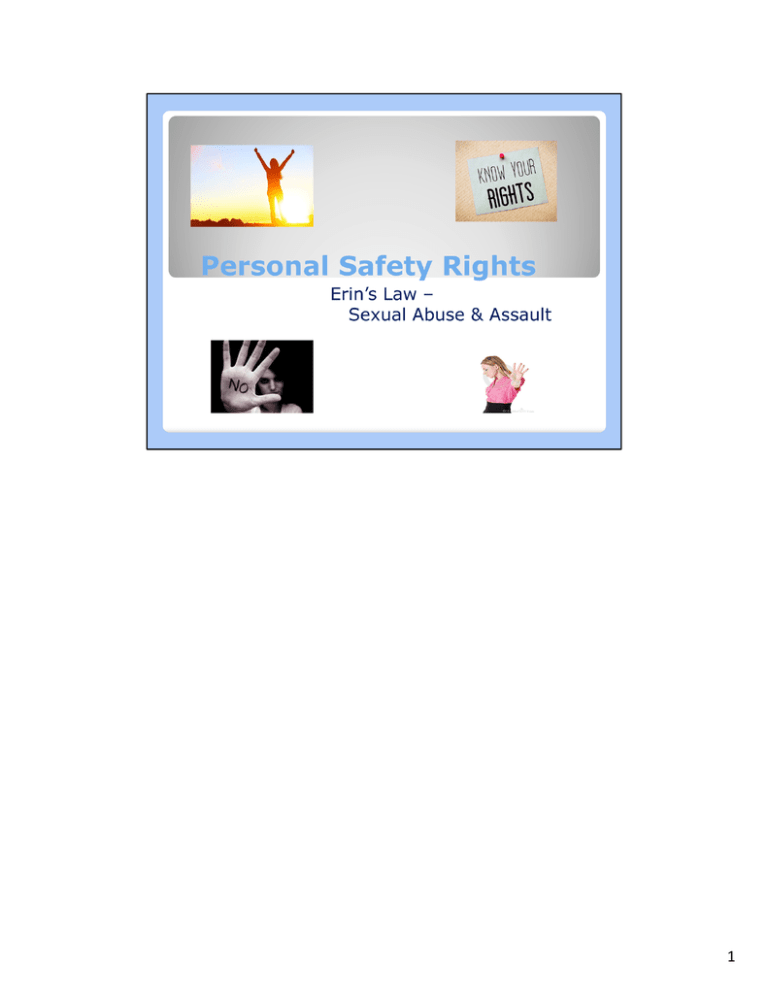
1
We will be talking about:
• Different related terms
• Current statistics
• How Erin’s Law applies to you
• Your Personal Safety Rights, how they can be violated and
• How you can keep your rights
• We will offer you resources in and out of school as well
2
(The legislation also generally provides for some type of referral, counseling or safe way for children to report incidences of child sexual abuse and requires training for school personnel. Many states have also required task forces to further study the issue and provide statewide recommendations). These laws are most commonly known as Erin’s Laws, taking the name of the most active proponent of these laws, Erin Merryn, a victim of sexual abuse as a child and prominent activist in the effort to further prevent child sexual abuse.
3
Video is about 4 minutes long. Right click to open.
4
5
6
•
Sexual Assault – Any unwanted sexual activity that involves
any type of penetration/sexual intercourse by any body part of
foreign object, through force or the threat of force.
•
Sexual abuse – Any unwanted sexual touching, either directly
or through clothing, which does not include
penetration/intercourse and is done through force or the threat
of force.
•
Acquaintance Sexual Assault or Acquaintance Rape – Any
forced unwanted sexual contact committed by someone who
knows the victim. If someone has forced you to have sex
against your will, that is rape even if you know the attacker.
•
Sexual Harassment – Unwanted sexual pressure that one
7
person inflicts upon another. (It can be male-to-male, femalefemale, male-female, or female-male).
•
Force or Threat of Force – When we think of force, we think of a
weapon, or someone actually holding someone down.
However, force also includes tone of voice, bribery, coercion,
manipulation or trickery. … being tricked, manipulated, or forced
to do something you really do not want to participate in.
•
Child Sexual Abuse- Can be perpetrated by an adult or a child
who exerts power over another. Sexual activity can include
touching and also non-touching (such as voyeurism/watching,
exhibitionism/showing, pornography, or internet crimes).
Consent – To consent is to agree to willingly participate or
engage in sexual activity.
>COMPLIANCE does NOT equal CONSENT……… there is
actually a “No Means No” Law.
> Compliance – A person may comply with something
proposed to them, but that action may not necessarily be
consensual.
> Consent – Giving permission for something to happen
•
7
8
9
MORE DETAILED EXPLANATION (TO SHARE WITH CLASS):
1. You Have the Right to Set Sexual Limits You may have
different limits with different people and your limits
may change. It’s a good idea to know what you want
or do not want. Communicate those Limits - Get
those limits across to the other person.
2. Trust Your Feelings If you feel that you are being
pressured into unwanted sex, you are right.
3.
Pay Attention to Behaviors or patterns of behavior
that do not seem right:
• Someone purposely sitting or standing too close.
• Someone who power stares — looking through
you or down at you.
• Someone who blocks your way.
• Someone speaking in a way or acting as if he or
she knows you more intimately than is
appropriate.
10
Someone who grabs or pushes you to get his or her
way.
• Someone who does not listen or disregards what
you are saying, like “NO”.
4. Be Assertive
•
Say NO
• Get angry when someone does something to you
that you do not want.
• Act immediately with some kind of negative
response
• Stand up for yourself —it’s OK to be rude to
someone who is sexually pressuring you, even if it
hurts their feelings. After all, they are not paying
attention to your feelings.
•
5. Be aware of your surroundings – Be very
conscious about who is around you, staying with
friends at social events and do not be alone
when you are walking anywhere, especially at
night. Do not get into a car without at least one
friend with you and without knowing the driver.
10
* YOU CAN READ THESE DESCRIPTIONS IF YOU WANT TO,
OR IF THEY HAVE QUESTIONS LATER, YOU CAN REFER
BACK TO THESE:
Post-Traumatic Stress Disorder
Prolonged feelings of anxiety, stress, or fear can be a sign of
post-traumatic stress disorder (PTSD).
Self-Harm
Some survivors of sexual assault may use self-harm to cope
with difficult or painful feelings.
Flashbacks
It’s possible for memories of a past trauma to feel like they are
taking place in the current moment.
Isolation – Preferring to be alone, not interacting with
others as much, can exhibit less eye contact and looking
down
11
Sexually Transmitted Infections
STIs can occur during any sex act, even if this contact was
unwanted or forced.
Depression
Feelings of sadness and unhappiness that have a negative
impact on your life could be a sign of depression.
Substance Use
There are a number of reasons that survivors report using
substances like alcohol and drugs.
11
12
This power point can be found on the following LZHS web pages: Student Resources> Deans & Student Services and Counseling
13
14
15


